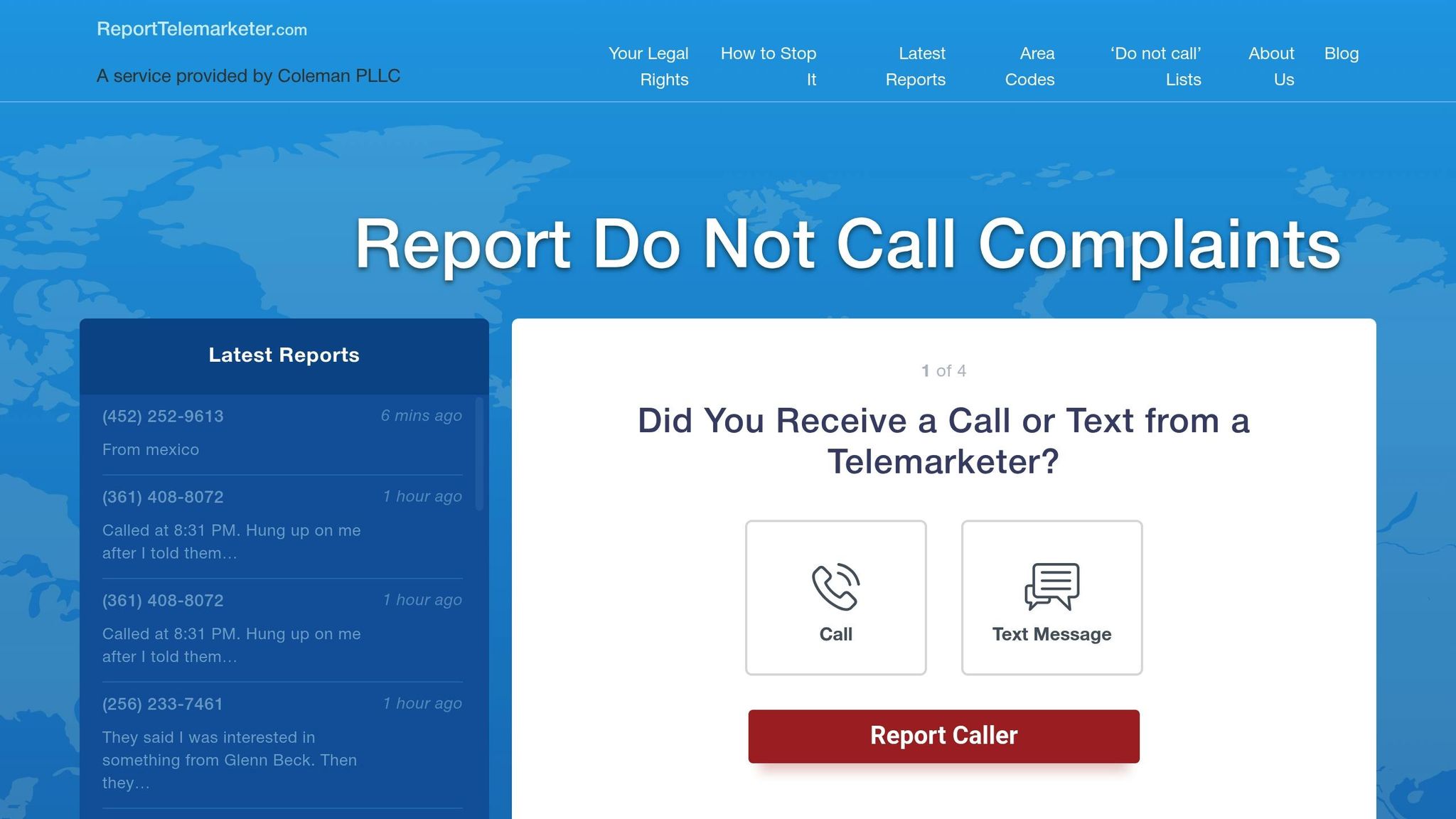
Differential privacy is changing how telemarketers handle personal data. It protects individual privacy while allowing companies to analyze trends and improve their strategies. Here’s why it matters:
- Telemarketing Laws Are Strict: The TCPA (Telephone Consumer Protection Act) requires businesses to get written consent before making robocalls. Violations can result in fines as high as $1,500 per call or millions in lawsuits.
- Data Breaches Are Expensive: Companies like Target and others have faced multi-million-dollar penalties for exposing sensitive customer data.
- Differential Privacy Offers a Solution: By adding mathematical noise to data, it protects individuals while still allowing useful insights. This approach ensures compliance with privacy laws and builds consumer trust.
- Challenges Exist: Implementing differential privacy can be costly and technically complex, especially for smaller businesses.
For telemarketers, adopting differential privacy isn’t just about compliance – it’s about staying competitive in a world where privacy is a growing concern.
A short tutorial on differential privacy: Dr Borja Balle, Amazon Research

How Differential Privacy Works
Differential privacy works by introducing carefully calculated noise into data, protecting individual contributions while still allowing meaningful insights. Unlike older methods that simply mask or delete identifying details, this approach uses mathematical techniques to add randomness to data analysis. This ensures that individual data points remain virtually undetectable, even if attackers have access to additional information.
What Differential Privacy Means
At its heart, differential privacy is a way to safeguard personal data within datasets while still making it possible to extract useful insights about a larger group. The main idea is that an individual’s data has such a small impact on the overall results that it’s nearly impossible to tell if their information is included or not. This balance between privacy and utility is what makes differential privacy so effective.
This principle is especially relevant for industries like telemarketing, where data breaches can be costly. Traditional anonymization methods, as history shows, have failed in the past. For instance, in 1996, a researcher from MIT was able to identify the health records of Massachusetts’ governor by cross-referencing released data with voter registration records. Similarly, in 2006, Netflix user data was de-anonymized by comparing it with IMDb ratings. Differential privacy addresses these vulnerabilities by ensuring no single data record can disproportionately influence the analysis.
The Technical Process of Differential Privacy
The mechanics of differential privacy involve adding calibrated noise to data queries. This ensures that whether or not an individual’s data is included, the results of the analysis remain largely unchanged. The amount of noise added depends on the sensitivity of the analysis, which determines how much an individual’s data could affect the outcome.
This process introduces a trade-off: more noise increases privacy but reduces the usefulness of the data. This balance is controlled by a parameter called epsilon (ε). A smaller ε value provides stronger privacy but sacrifices some accuracy, while a larger ε value prioritizes accuracy over privacy. Experts often recommend keeping ε below 1 for stronger privacy protections.
There are two main approaches to implementing differential privacy. Noise can be added directly to aggregated data (global mode) or to individual data points before aggregation (local mode). Global differential privacy is generally preferred because it provides more accurate results for the same level of privacy. In telemarketing, this method allows companies to study trends like customer response rates and demographic patterns without risking individual privacy. The noise level is adjusted based on data sensitivity and the chosen ε value, giving companies precise control over the balance between privacy and data utility.
Differential privacy stands out by offering measurable guarantees of privacy, even if attackers possess additional background knowledge. For telemarketers, this means they can analyze consumer behavior and improve strategies while keeping individual data secure. By relying on aggregated insights, companies can protect privacy without compromising their ability to make informed decisions.
Using Differential Privacy for Telemarketing Compliance
Telemarketing companies operate in a highly regulated environment, where effective data management is crucial. With the Federal Trade Commission (FTC) receiving around 250,000 complaints every month regarding TCPA violations, and penalties reaching up to $1,500 per call, staying compliant isn’t just a recommendation – it’s a necessity. Differential privacy offers a practical way to safeguard data while ensuring telemarketing practices align with legal standards.
Protecting Data in Telemarketing Operations
Differential privacy brings a modern approach to securing sensitive consumer data. For instance, when analyzing call performance metrics, companies can evaluate response rates and demographic trends without exposing any individual’s information. The use of mathematical noise in analytics ensures that personal details remain untraceable.
Call analytics systems powered by differential privacy focus on aggregated trends, delivering valuable campaign insights while addressing privacy concerns. This is especially relevant, considering that 81% of people feel they lack control over their personal data.
Opt-out management also benefits from this approach. By applying differential privacy to do-not-call databases, companies can securely process and analyze opt-out patterns without risking the exposure of individual identities. This ensures compliance while maintaining consumer trust.
Additionally, differential privacy helps generate compliance reports and analyze customer satisfaction data. These reports, built on aggregated and anonymized statistics, not only protect privacy but also support legal obligations in telemarketing operations.
Meeting Legal Requirements Through Differential Privacy
Beyond operational advantages, differential privacy is a powerful tool for meeting legal requirements. For example, the TCPA mandates prior express written consent for telemarketing communications, creating significant data management challenges. With differential privacy, organizations can analyze consent trends and campaign outcomes while maintaining the privacy of individual records.
Modern privacy laws emphasize data minimization – keeping only the data you need and disposing of the rest. Differential privacy aligns perfectly with this principle. It allows companies to extract insights without retaining detailed personal profiles, reducing storage risks while preserving the ability to analyze key metrics.
Training employees on differential privacy protocols ensures teams understand how to work with privacy-protected data. This reduces the chances of unintentional privacy breaches while enabling informed decision-making.
Cross-border data transfers also benefit from differential privacy, as it provides measurable safeguards that help meet various international regulatory requirements. It’s particularly useful for managing expanded revocation rules, which require honoring opt-out requests within ten business days. By integrating differential privacy into customer relationship management systems, companies can quickly process these requests while still gaining insights into campaign performance and customer preferences.
Access control becomes simpler with privacy-protected datasets. Employees can work effectively without needing access to sensitive details, and compliance audits are more efficient. Auditors can review privacy-secured data and processes without handling raw consumer information, making oversight both easier and more secure.
sbb-itb-a8d93e1
Benefits and Challenges of Differential Privacy in Telemarketing
Advantages of Differential Privacy
Differential privacy brings several clear advantages to telemarketing. For starters, it helps businesses stay on the right side of the law, particularly with regulations like the TCPA. Considering that TCPA violations can cost up to $10,000 per incident and the average lawsuit judgment hits $6 million, adopting differential privacy acts as a protective shield against these hefty penalties.
Another major perk? It builds consumer trust. With 81% of people feeling they lack control over how their data is used, differential privacy offers a way to address those concerns. By using mathematical methods to safeguard individual information, businesses can show customers they take privacy seriously. This not only enhances credibility but also strengthens customer relationships.
Data breaches are another area where differential privacy shines. Even if a system is compromised, this approach ensures individual details – like credit card numbers or Social Security numbers – remain protected. This significantly reduces the chances of identity theft and fraud.
On top of that, differential privacy makes compliance monitoring smarter. It allows companies to gain valuable insights from data without exposing individual records. This means telemarketers can improve their strategies and customer interactions while keeping privacy intact. Plus, when consumers know their data is securely protected, they’re more likely to engage with telemarketing efforts, leading to higher response rates and better outcomes.
But, as with any solution, there are challenges to consider.
Implementation Challenges
While differential privacy offers clear benefits, putting it into practice isn’t without hurdles. For one, the technical complexity can be a major roadblock. Many telemarketing companies lack the in-house expertise to implement these advanced techniques, which means they may need to invest in staff training or hire specialists to bridge the knowledge gap.
Cost is another concern. Setting up and maintaining a differential privacy system can be expensive, which could be a strain for smaller businesses with limited budgets.
Then there’s the issue of data accuracy. Differential privacy works by adding mathematical noise to datasets, which can make it harder to extract precise insights – especially when dealing with smaller datasets. Striking the right balance between privacy and actionable data becomes a tricky endeavor.
Adapting legacy systems to support differential privacy adds another layer of complexity. It’s not just about installing new software; it often requires overhauling existing infrastructure. Training staff to work with these updated systems is equally important to ensure smooth operations.
Regulatory compliance also remains a challenge. While differential privacy helps with overall compliance, companies still need to navigate varying legal requirements across jurisdictions. Non-compliance with laws like GDPR, for instance, can lead to fines as high as €20 million or 4% of global annual revenue. This makes it critical to ensure every implementation meets the necessary legal standards.
Lastly, measuring success in a privacy-protected environment can be tricky. Traditional metrics may not work as well, so businesses often need to develop new performance indicators that account for the intentional noise introduced by privacy measures. This adds another layer of complexity to assessing the effectiveness of telemarketing strategies.
Consumer Protection Through ReportTelemarketer.com

How ReportTelemarketer.com Protects Privacy
Even with businesses adopting advanced privacy measures, many consumers still need straightforward ways to safeguard their personal information. That’s where ReportTelemarketer.com steps in, maintaining strict privacy practices that align with key legal standards.
When users report unwanted calls, the platform ensures sensitive details like email addresses and phone numbers remain confidential. Only essential information – such as the user’s name, the telemarketer’s phone number, call details, and the report date – is made public. This approach mirrors the principles of differential privacy by protecting individual data while still highlighting broader trends.
The platform’s commitment to collecting only the necessary data gives users clarity on how their information is handled. It also offers the option to opt out of marketing emails, addressing a major concern in today’s digital age. With 81% of people feeling they lack control over their personal data, this transparency helps build trust and reduces privacy risks. This careful management of user data is key to the service’s proactive role in consumer protection.
Taking Action Against Unwanted Calls
ReportTelemarketer.com doesn’t just safeguard privacy – it also empowers users to fight back against unwanted telemarketing. The platform has already assisted over 30,000 individuals in taking action against intrusive calls and texts, proving just how much demand there is for this kind of service.
The process is straightforward: consumers fill out a simple report form, and Coleman, PLLC – the firm behind the platform – steps in to investigate. Using proprietary tools, they identify violations of telemarketing laws. When violations are confirmed, the firm issues cease-and-desist letters or files formal complaints to put an end to the unwanted calls.
Violators face penalties of $500 per call, which encourages consumers to report promptly. Best of all, the service comes at no out-of-pocket cost to users, as attorney fees are recovered directly from telemarketers after successful enforcement actions. This ensures that consumers can seek justice without worrying about financial barriers.
Conclusion
Differential privacy offers telemarketers a way to analyze customer data while safeguarding individual privacy, even amidst strict regulatory requirements.
This method not only addresses long-standing consumer privacy concerns but also helps establish trust – a crucial factor in today’s data-driven world.
However, technology alone isn’t enough to ensure privacy. Strong enforcement mechanisms, like those demonstrated by ReportTelemarketer.com, play a critical role in shielding consumers from unwanted calls and privacy breaches.
By combining advanced privacy tools with effective enforcement, businesses can create a comprehensive strategy to protect consumer data. This dual approach not only strengthens privacy safeguards but also builds a foundation for responsible data use.
As this approach continues to develop, adopting differential privacy will become a necessity for earning consumer trust and steering clear of legal pitfalls. Companies that take the lead in implementing these measures while being transparent about their data practices will position themselves for success in the ever-changing regulatory environment.
FAQs
What makes differential privacy more effective than traditional data anonymization for protecting personal information?
Differential privacy offers a more robust way to safeguard individual privacy compared to traditional data anonymization techniques. Traditional methods typically involve removing or obscuring identifiable details, but they often fall short, leaving data susceptible to re-identification – especially when combined with other datasets.
What sets differential privacy apart is its use of precisely calculated noise. By adding this noise, it becomes nearly impossible to link any piece of data back to an individual, even if additional datasets are available. This method not only strengthens privacy protection but also allows organizations to analyze and utilize the data without compromising security. This balance is particularly crucial in scenarios like compliance with telemarketing laws under the TCPA, where protecting consumer information is a top priority.
What challenges do small telemarketing businesses face with differential privacy, and how can they address them?
Small telemarketing businesses often struggle with navigating differential privacy due to limited budgets and the intricate requirements of laws like the TCPA. These regulations demand clear consent and robust data protection, which can feel overwhelming without the right expertise or financial resources.
To tackle these hurdles, small businesses can take practical, budget-friendly steps, such as:
- Collecting only essential data: Focus on gathering just the information needed to run your operations effectively.
- Being upfront with customers: Clearly explain how their data will be used to build trust and transparency.
- Leveraging affordable solutions: Explore cost-effective compliance tools or seek expert guidance to streamline privacy management.
By applying these straightforward measures, small telemarketing businesses can strengthen their privacy practices, maintain compliance with regulations, and build stronger relationships with their customers.
What is epsilon (ε) in differential privacy, and how does it balance privacy and data usefulness?
Epsilon (ε) plays a crucial role in differential privacy, serving as a "privacy budget" that determines the trade-off between protecting individual privacy and maintaining data usefulness. Essentially, it controls the amount of statistical noise added to the data.
A smaller ε value means stronger privacy because more noise is introduced, but this can make the data less useful for analysis. Conversely, a larger ε value reduces the noise, improving data accuracy, but weakens privacy protections. Striking the right balance with ε is essential to safeguarding sensitive information while still allowing for meaningful insights from the data.